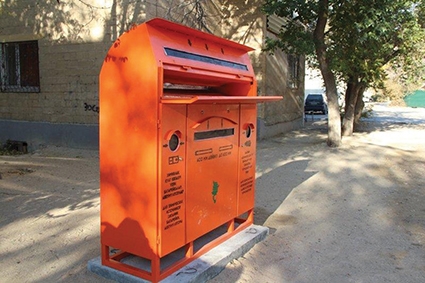Green Technologies Introduced in Pavlodar, Kazakhstan
Two hundred containers for the disposal of mercury-containing bulbs are to be installed in the cities of the Pavlodar region of Kazakhstan, Pavlodar, Ekibastuz, and Aksu, at no cost. In the regional center, there will be 160 containers, in Ekibastuz 30 and 10 in Aksu.
According to specialists of the Pavlodar Regional Administration of Subsoil Use, Environment and Water Resources, locations for containers were agreed with the departments of housing and communal services. An orange container for collecting used fluorescent bulbs consists of four compartments designed for bulbs of different sizes. Two for linear lamps 600 mm and 1200 mm long, and two more for bulbs with a conventional cap. To prevent the bulbs from bleeding, the bottom of the compartments is lined with isoplene. Each compartment is locked with a key, securing it from potential thieves.
The first such container in Pavlodar appeared two years ago on the private initiative of an entrepreneur from Ekibastuz, the Director of ElectroTrans Reelto, Vladimir Kolesnikov.
“My attempts to get the regional authorities involved [at the time] yielded nothing and the pilot project of the enterprise started in Astana showed that it is efficient: three hundred containers, which were installed there saw up to 500 thousand bulbs collected over a year,” Kolesnikov said. “For three consecutive years, Pavlodar region will now have funds allocated for the recycling of 20 thousand bulbs, with the aim of increasing that to up to 1 million units per year.”
On the premises of ElectroTrans Reelto, there is a facility for the processing of mercury-containing waste, purchased in the Russian city of Dubna for 30 million Tenge ($89.697). It is based on the method of cryogenic demercurization, which is considered to be the safest and most effective today. No disposal carried out at this facility requires separate burial due to an active recycling process, for example, the glass crumb is used as building material.
Moving this project forward is the fact that containers have now been donated by LLP Operator ROP’.
"At the beginning of the year, we requested all areas to be supplied with such recycling containers,” said Timur Ismanov, manager of ROP Operator. “As part of the tender, purchases were made, and now we are at the finish line. The contractor is installing containers on the ground in the regions, and these will be transferred to the balance of local executive bodies under a gift contract. This action is stipulated by the Environmental Code and our investment policy. Across the country, in 10 regions, 1,951 containers will be installed."
Dimitri Dolaberidze











